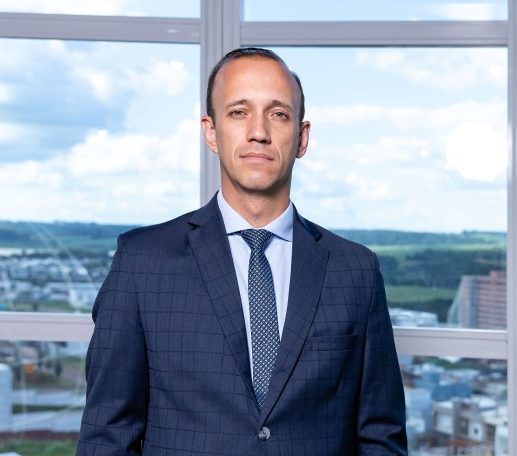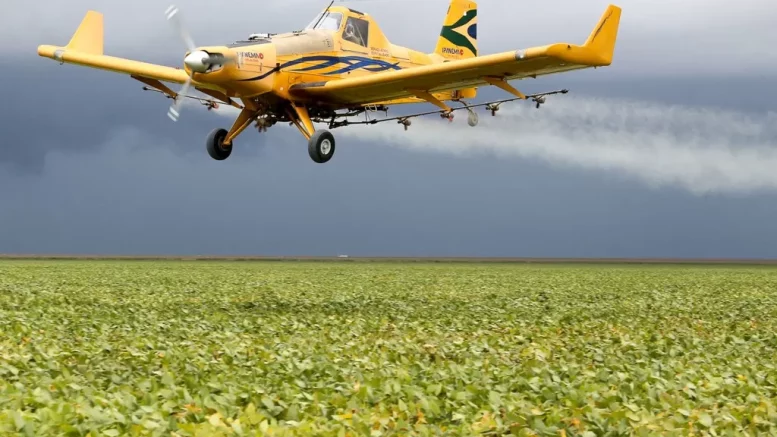“This is because it began to demand qualification and transparency from terrestrial spraying, which is something that had been routine in agricultural aviation since the 1960s…”
Gabriel Colle is the executive director of the National Union of Agricultural Aviation Companies – Sindag and the Brazilian Institute of Agricultural Aviation – Ibravag. Colle is an agronomist from the Federal University of Pelotas, with a master’s degree in administration and an MBA in agribusiness from Atitus Educação.

Gabriel Colle, executive director at Sindag
AgriBrasilis – The State of Ceará has banned aerial spraying. How is this impacting agriculture?
Gabriel Colle – The main impact of the ban on agricultural aviation in the State of Ceará was an increase in the number of applications needed on crops that were once served by planes. Therefore, the ban resulted in a greater use of products. Consequently, it also resulted in greater exposure of people to risks in operations, as one of the main alternative tools were backpack sprayers, especially in banana crops.
AgriBrasilis – Will other States adopt similar measures?
Gabriel Colle – We believe that won’t happen, because it has become clear how much this represents in crop losses and in greater risk in the agricultural operations and to the environment. But there are projects underway in this direction, for example, in the States of Mato Grosso do Sul and Rio Grande do Sul. Even so, these are States that depend on agriculture, and where everyone understands very clearly how insane it would be to remove such a technical, regulated tool from the scene, which guarantees high yields and the rational use of inputs.
We have worked hard to bring clarity to legislators. So much so that we are also seeing the opposite movement: bills in the States of Rio Grande do Sul, Santa Catarina and Espírito Santo declaring agricultural aviation “a tool of relevant public and economic interest”.
AgriBrasilis – How does the new Pesticide Law, No. 14785/2023, affect agricultural aviation?
Gabriel Colle – In general, we believe that the new law benefits agricultural aviation. This is because it began to demand qualification and transparency from terrestrial spraying, which is something that had been routine in agricultural aviation since the 1960s. For example, the signature of the pesticide applicator [the person that performed the pesticide application] on the prescription is now required. This increases the transparency and traceability of pesticide spraying.
In aviation, for decades each application that was carried out had to generate complete reports, identifying the entire team involved, with the signature of the pilot, agronomist and technician, including a map of the treated area and various other data.
AgriBrasilis – What is the harm caused by aerial spraying to the environment and pollinating insects?
Gabriel Colle – Harm caused by spraying – whether to the environment, pollinating insects, neighboring crops or even people – occurs when ideal weather conditions are not observed, when the correct technology is not utilized, or when the technical guidelines for each product are not followed.
The risk exists, but it is not exclusive to “aerial spraying”. It’s “the spraying” in general that has risks. This applies even to backpack sprayers, which have the same risk of drift as the aircraft do, when the ideal parameters are not observed.
AgriBrasilis – What other recent regulatory changes were important for the sector?
Gabriel Colle – In fact, some important changes are undergoing right now. In addition to the new Pesticides Law, published in December of 2023, the sector’s main standards and rules are currently in the final phase of their modernization processes, awaiting the publication of their new versions by the Ministry of Agriculture. This is the case of the review of Normative Instruction No. 02/2008 (on operations with planes and helicopters) and Ordinance No. 298/21, which regulates operations with spraying drones in crops, in addition to the text replacing Decree No. 86.765/1981, which regulates aeroagricultural activity in general.
AgriBrasilis – Can drones ever replace manned aircraft? Why?
Gabriel Colle – Both are tools that, in fact, complement each other. There is no way to compare, on a larger farm, the productivity and speed of a manned agricultural plane. At the same time, remote tools are ideal for smaller areas and for reaching certain points with obstacles or spraying near environmentally sensitive areas in larger farms. Therefore, at Sindag we have members who operate with manned planes, others who operate with drones, and some companies which use both types of tools, acting in a complementary way.
AgriBrasilis – How is it possible to minimize the risks of agricultural drift?
Gabriel Colle – Through appropriate techniques and technologies, and by respecting the climatic conditions and guidelines for each product. This applies to both aerial and ground equipment. We have nozzles and atomizers, product adjuvants and instruments to assess weather conditions. Furthermore, in aviation, legislation requires that almost everyone involved in operations be at least a specialized technician.
READ MORE:

